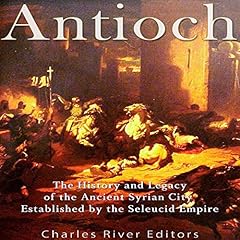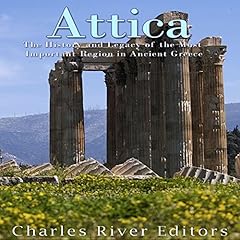
Heliopolis: The History and Legacy of Ancient Egypt's Cult Center for the Sun God Atum
Artikel konnten nicht hinzugefügt werden
Der Titel konnte nicht zum Warenkorb hinzugefügt werden.
Der Titel konnte nicht zum Merkzettel hinzugefügt werden.
„Von Wunschzettel entfernen“ fehlgeschlagen.
„Podcast folgen“ fehlgeschlagen
„Podcast nicht mehr folgen“ fehlgeschlagen
Nur 0,99 € pro Monat für die ersten 3 Monate
 Bist du Amazon Prime-Mitglied?
Bist du Amazon Prime-Mitglied?Audible 60 Tage kostenlos testen
Für 7,95 € kaufen
-
Gesprochen von:
-
Jim D Johnston
Über diesen Titel
Africa may have given rise to the first human beings, and Egypt probably gave rise to the first great civilizations, which continue to fascinate modern societies across the globe nearly 5,000 years later. From the Library and Lighthouse of Alexandria to the Great Pyramid at Giza, the Ancient Egyptians produced several wonders of the world, revolutionized architecture and construction, created some of the world’s first systems of mathematics and medicine, and established language and art that spread across the known world. With world-famous leaders like King Tut and Cleopatra, it’s no wonder that today’s world has so many Egyptologists.
What makes the accomplishments of the Ancient Egyptians all the more remarkable is that Egypt was historically a place of great political turbulence. Its position made it both valuable and vulnerable to tribes across the Mediterranean and the Middle East, and Ancient Egypt had no shortage of its own internecine warfare. Its most famous conquerors would come from Europe, with Alexander the Great laying the groundwork for the Hellenic Ptolemy line and the Romans extinguishing that line after defeating Cleopatra and driving her to suicide.
Part of the reason Egyptian history is so intriguing is because it is so enigmatic - even today, despite the wealth of written materials and countless monuments, Egyptologists constantly uncover more mysteries about ancient Egypt, even if many of those mysteries are somewhat mundane and appeal more to academics. For example, historians still debate precise chronologies of dynasties, theological nuances, and architectural details.
The city of Heliopolis was one of ancient Egypt’s most important religious centers, the focus of the civilization’s solar cult, and a destination for pilgrims for nearly 3,000 years. It was at Heliopolis where Egyptian priests developed one of Egypt’s three major creation myths, which, like any aspect of a culture that survived for as long as Egypt’s did, evolved throughout the centuries. Heliopolis’ origins were quite humble though, and it does not appear that it was ever planned to be a great city. The city began as a small settlement in the late 4th millennium BC, but within a couple of hundred years it became the center of Egypt’s solar religion, due to several fortuitous circumstances.
Heliopolis’ proximity to the political capital of Memphis no doubt helped with its early growth, as did its patronage by some important early kings. By the Middle Kingdom (c. 2055-1650 BCE), Heliopolis was one of the most important religious centers in Egypt, and the most important kings saw it as essential to erect monuments in the city. As Egypt’s dynasties and kingdoms rose and fell, Heliopolis, the “City of the Sun,” kept shining, attracting numerous kings to leave their mark. Throughout the New Kingdom (1550-1069 BCE) and the Late Period (728-332 BCE), Heliopolis continued to attract kings, sometimes foreigners, who wanted to establish their legitimacy as pharaohs.
Although Heliopolis faded and eventually disappeared as an important religious center after the Greeks and Romans took control of Egypt, its memory remained. The name Heliopolis is actually Greek for “city of the sun”, while the Hebrews knew it as “On”, proving that its historical memory was (and remains) quite strong.
Heliopolis: The History and Legacy of Ancient Egypt's Cult Center for the Sun God Atum examines the city and the various purposes it served; you will learn about Heliopolis like never before.
©2019 Charles River Editors (P)2020 Charles River Editors



















